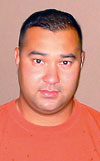Marine sees changes on second Iraqi mission
By Sam Atkins
Published in News on October 18, 2004 2:02 PM
The threat of fire does not diminish whether military personnel are engaged in battle or protecting their camp from invasion, a U.S. Marine says.
First Lt. David Wright of Goldsboro returned in September from his second tour of duty to Iraq, and his experiences were quite different the second time around.

First Lt. David Wright
From January through September 2003, he served as a platoon commander and was among the invading troops. He returned and then was sent back to help bring peace to the unstable country.
During his first nine months in Iraq, he moved from one desert to another before setting up camp 26 miles south of the Iraqi border in Kuwait. He was responsible for nearly 60 men and his Marines spent several months training for battlefield scenarios, such as learning to identify hostile soldiers, practicing first aid and preparing to ship out, he said.
In March they moved into Iraq and within two hours, the Marines were ambushed. Their superior firepower prevailed. They sporadically encountered gunfire as they headed for Baghdad. About five days into the invasion, his company was enclosed in by other troops while shells were detonating less than a mile away.
His Marines didn't suffer any losses in the three weeks it took to get to the Iraqi capital. He had three men injured, though, in the first day in Baghdad, he said.
He was awarded the Navy and Marine Corps Achievement Medal with combat distinguishing device on in October 2003 by the secretary of the Navy. It was to recognize Wright's achievement while serving as a platoon commander in support of Operation Iraqi Freedom in March.
He returned in September 2003 to his base in Twentynine Palms, Calif., but only for a short while.
He deployed again to Iraq in February and his role was a lot different.
Wright, the son of Larry and Phong Wright of Goldsboro, was visiting home last week after his eight-month deployment. He has been in the Marine Corps for 10 years, enlisting a few months after his graduation from Eastern Wayne High School.
He agreed to talk Friday afternoon about his experiences during a visit to the News-Argus, where his mother works.
Wright, 29, continued to serve as a platoon commander, but this time for the weapons platoon of Company I, which has 48 Marines. His mission was to guard the Syrian border and prevent anyone from smuggling arms into Iraq.
He also provided perimeter security about 15 miles out around their camp in the city of Al-Qain, so other Marines inside the camp could conduct logistics, work on vehicles and do other business.
Anti-Iraqi forces and insurgents bombarded his battalion with rockets at least two times a week from the beginning. One hit about 250 meters from his living space. They would try to determine where the rockets were coming from and try to prevent it from happening again, but that was tough.
"We didn't want an itch to become a rash," he said.
Improvised explosion devices, or IEDs, were a major threat to the Marines. Wright's battalion lost 18 Marines in the seven-month deployment, many because of IEDs set off on the side of the road while their convoy was patrolling the city.
"The place is like a land mine," he said.
The worst part of the deployment was going to the memorial services, he said. The company commander, a gunnery sergeant, several non-commissioned officers, lance corporals and others were killed. The battalion has over 180 Purple Heart recipients.
Living conditions were a little better his second deployment. During his first deployment, he went months without a bed, weeks without a shower and many nights without sleep.
This time they rebuilt a condemned train station located in the middle of the desert and were stationed there the whole time instead of moving from one building to another.
He was on a six-day rotation. He spent two days training, two days providing security around the base and then had two days off. His platoon had three squads -- mobile, which would patrol using Humvees; mechanize, which would patrol using assault vehicles; and retransmission, which was in charge of guarding the communication radios in the vehicles.
"If you can't communicate you can't operate," said Wright.
The 143-degree heat with no shade was hard to bear when guarding the camp. It would cool off from 11 p.m. to 9 a.m., but as soon as the sun came up it was hot, he said.
Wright had no time to engage in such activities as helping rebuild schools and establish local city councils in Iraq, which he had done the first time.
The platoon did spend time training the Iraqi national guard, Iraqi police and Iraqi border patrol. He said they are learning, but it is a work in progress.
He said the Marines do not want to go back to Iraq a third time and going to Afghanistan is more appealing. He said his favorite part about serving in Iraq was being in the desert with his fellow Marines, which ranged in age from 20 to 28 years old, and seeing them perform their duties.
Since he returned in September, Wright has been relaxing, enjoying some hot meals and spending time with his family. He said he could deploy again as early as May. The destination is unknown at this point. Having only minimal time off before deploying is nothing new.
"It's not just a job, it's a lifestyle," said Wright.
